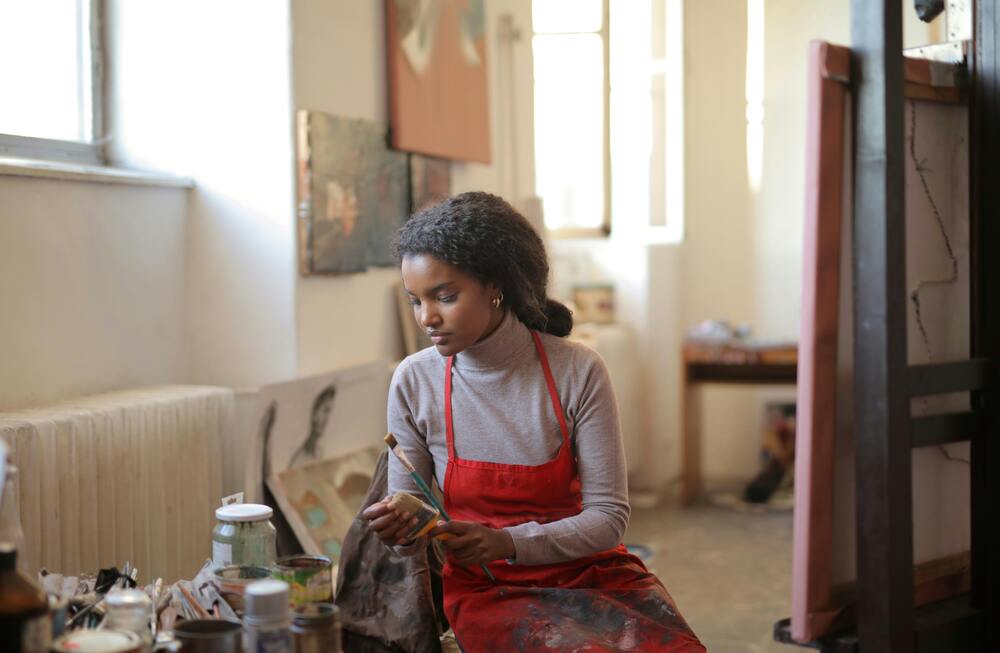The Visual Arts extended essay is a crucial milestone in your IB way. In my extensive experience consulting on IB subjects, this work becomes a proving ground for your understanding, not just of art but of research and rigorous academic writing. Moreover, it can seriously boost your overall IB score. So, let’s get started!
What Is a Visual Arts Extended Essay?
What exactly goes into a Visual Arts extended essay? It’s elementary. Just consider it an academic thesis focused squarely on a Visual Arts subject. Based on my experience, this essay combines your artistic insights with stringent academic norms. It’s not just about liking or disliking a piece of art; it’s about interpreting it, critiquing it, and placing it in a broader context.
So, this research-intensive piece could range from the works of a particular artist to an artistic movement or even a thematic investigation, such as the representation of gender in 20th-century art. From my experience as a seasoned IB writer, I know that Visual Arts as a discipline has a keen eye for detail, both in observing art and in interpreting its meaning within broader social, historical, or theoretical contexts.
Visual Arts Extended Essay Word Count
If you’re a student like the hundreds I’ve advised, you’re probably concerned about hitting that word count target. Also, we need to emphasize a few important points here:
- Remember that the word count only includes the core parts of your essay (the introduction, the body, and the conclusion).
- Other elements like your table of contents, footnotes, bibliography, and appendices don’t count toward this limit. Knowing this can help you plan your essay more efficiently.
Usually, your Visual Arts extended essay should hover around 4,000 words. Yes, you heard it right! That might sound like a lot, but trust me, once you start writing, the text will flow. However, sticking to the word count is crucial for scoring well.
Grasping the IB Extended Essay Visual Arts Rubric
Ah, the rubric — a guiding light in the darkness of academic uncertainty! According to general IB criteria, it’s your best friend for understanding what examiners are looking for in your essay:
- Focus and Method. This first criterion evaluates how well you’ve defined your research question and the methodology you’ve used to address it.
- Knowledge and Understanding. This part measures the depth of your understanding of the topic you’ve chosen.
- Critical Thinking. The ability to critically evaluate different points of view, theories, or works of art is central to a high-scoring extended essay.
- Presentation. It includes structure, layout, and overall readability.
- Engagement. Finally, your level of personal engagement with your chosen topic is assessed.
From my experience, the knowledge of the IB extended essay Visual Arts rubric is crucial for a good score.
How to Choose IB Extended Essay Topics for Visual Arts?
When choosing a topic for your Visual Arts Extended Essay, passion is everything. Why is that? The more intrigued and engaged you are with your topic, the more enthusiasm will be reflected in your writing. Students who are passionate about their essay topic tend to do more research and write more persuasively, which improves the overall quality of their essays.
Options could range from studying the impact of Renaissance art on modern culture to the representation of women in 19th-century paintings. You see, the possibilities are numerous, but each comes with its challenges.
By the way, you can find so many Visual Arts extended essay topics on our blog and choose the most suitable one.
What to Avoid in Topic Selection
According to general IB criteria, choosing a topic that’s too general can cause your essay to lack focus and depth. Imagine trying to cover all of Abstract Expressionism in 4,000 words; you’ll barely scratch the surface!
Another pitfall to avoid is choosing a topic with insufficient material to research. While obscure topics can be interesting, they can also be problematic if you need more scholarly resources to support your thesis.
Also, avoid topics that have been done to death. While it may be tempting to choose a topic that seems easy or is popular among students, remember that you’ll need to bring something new to the table to score high marks.
Extended Essay in Visual Arts: Effective Research Plan
When writing an excellent extended essay in Visual Arts, a well-thought-out research plan is crucial. In my opinion, the cornerstone of your research plan should be a balanced mix of primary and secondary sources. Failing to prepare adequately could be your Achilles’ heel, so ensure you’re well-armed for the intellectual battle ahead.
Importance of Primary and Secondary Sources
Primary sources offer you raw data or firsthand evidence. These could be the artworks you’re analyzing, interviews with artists or experts, or even historical documents that relate to your subject. They are the backbone of your essay, giving it legitimacy and depth.
Secondary sources, on the other hand, provide you with expert opinions and analyses, usually of the primary sources you are studying. Scholarly articles, critical essays, and books fit this category. They help you form a broader understanding and context for your research.
Planning Your Time
Poor time management is the downfall of many IB students. Make a timeline, stick to it, and you’ll be golden. Your timeline should include:
- Topic Selection. Allow sufficient time to select a compelling topic.
- Initial Research. A time to gather your primary and secondary sources.
- Outline Creation. Take a few days to develop a comprehensive outline.
- First Draft. Give yourself a generous window of time to write your first draft.
- Peer and Advisor Reviews. Allow time for others to review your work and provide feedback.
- Revisions. Allow ample time for multiple rounds of revisions.
- Final Review. Leave a week for a last review, additional edits, and proofreading.
Once you have a schedule, stick to it. Set reminders, use project management tools, or even resort to good old-fashioned sticky notes-whatever it takes to keep yourself accountable.
How to Write a Visual Arts Extended Essay Effectively
In the Visual Arts, you’re not just an academic; you’re an artist at heart. The challenge is to find the sweet spot between rigorous academic writing and the free spirit of artistic expression. In my experience, those who can marry these two realms produce the most compelling and impactful essays.

Drafting and Structuring
Drafting is the stage where your detailed outline and exhaustive research take shape. For each paragraph, start with a clear topic sentence that focuses on a particular point you want to make related to your overarching thesis. It helps maintain the coherence and flow of your essay.
Visual Arts Extended Essay Outline
Let me tell you, I cannot stress enough the importance of a well-written outline. It’s like having GPS for your essay. Whenever you feel lost, refer back to it. It helps you allocate your word count wisely, ensuring you’ve covered all the ground you intended to without meandering off into the wilderness of irrelevant detail.
Breaking Down the Writing Process
Writing an extended essay in Visual Arts is a monumental task. But as I know, the best approach is to break it down into manageable sections:
- Introduction. Here’s where you set the stage. Include your thesis statement and provide a roadmap for what the reader can expect.
- Body. It is where the magic happens. Each paragraph should have a unique focus yet contribute to advancing your argument.
- Conclusion. Wrap things up in a neat bow. Reiterate your main points and thesis, but also shed light on the broader implications of your findings.
Transition paragraphs can act as breathers and give the reader a moment to digest the material. Use this time to refocus your audience’s attention and prepare them for the next topic you’re about to discuss.
Polishing Your Visual Arts Extended Essay
Your first draft is likely not going to be your best work. And that’s completely fine! Revision is where the true essence of your essay comes to life. According to general IB criteria, a well-thought-out, refined essay is far more impressive than one that’s lengthy but shallow.

Need help with your IB extended essay?
From research and analysis to structuring and editing, our skilled mentors will be by your side, helping you craft an exceptional extended essay that not only meets the wordcount and stringent IB criteria but also reflects your passion for selected IB group.
Second Opinion Matters
You might think you’ve created a masterpiece on the first go, but getting peer feedback can offer you a reality check. These fresh eyes can help identify inconsistencies, logical gaps, or areas that need clarification. I’ve found this step indispensable for improving the overall quality of an extended essay in visual arts. The key here is to be open to criticism; it’s all constructive and aimed at making your essay the best it can be.
Final Check Before Submission
Now comes the home stretch. Before hitting that submit button, it’s critical to review everything meticulously. Start by checking your word count.
Exceeding the limit might require some trimming while falling short could indicate the need for additional support for your arguments. Ensure you adhere to the Visual Arts extended essay word count guidelines to avoid any last-minute hiccups. In addition, you’ll also need to:
- Check for Typos. They might seem trivial, but spelling errors can leave a wrong impression.
- Review Formatting. Make sure that your essay meets the IB’s formatting guidelines.
- Citations and References. Double-check that all your sources are correctly cited and that your bibliography is in order.
Trust me, the extra effort you put into polishing your Visual Arts extended essay will be well worth it when you see that outstanding score.
Summing It All Up
Congratulations! You’ve ventured through the process of writing a Visual Arts extended essay, a task not for the faint-hearted. From my experience, this project can be one of the most rewarding experiences in your academic life. I hope you find this as fulfilling as I find sharing my years of IB experience with you all. Remember that you can always contact our experienced IB writers for help with the Visual Arts extended essay.







